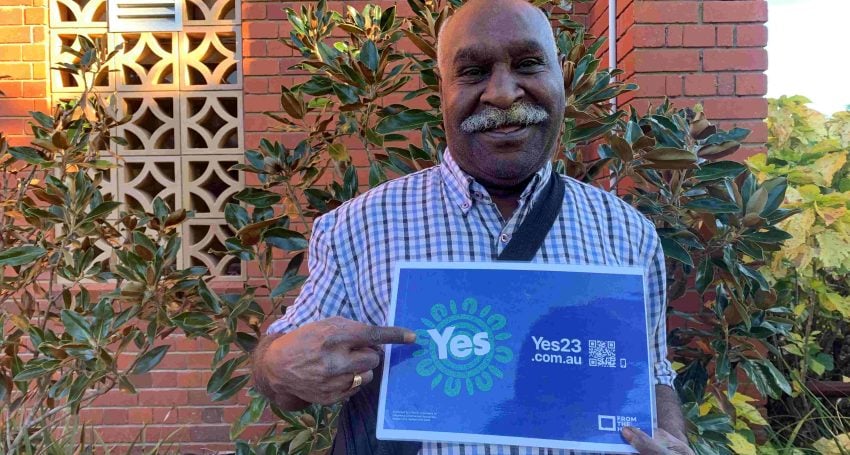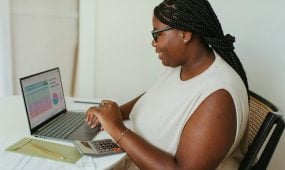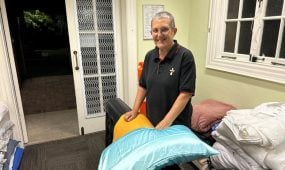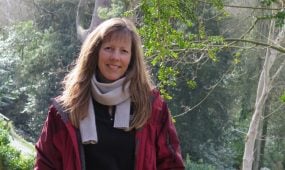Why I am voting "yes" in the referendum: Uncle Milton Walit
Justice & Advocacy
“Instead of going straight out to the beach to spear fish when our spears were ready one day, our father’s, father’s brother explained to us young ones about the movement of the tides — when to go out and when not to go out, when it was dangerous and when it was safe. Since then the sea has become much more dangerous because of the changing climate,” says Uncle Milton Walit from The Parish of Laidley

Story Timeline
Why I am voting “yes” in the referendum
- Why I support constitutional recognition through an Aboriginal and Torres Strait Islander Voice to Parliament: Aunty Dr Rose Elu
- Why I am voting “yes” in the referendum: Sue Cooke
- Why I am voting “yes” in the referendum: The Ven. Geoff Hoyte
- Why I am voting “yes” in the referendum: Phyllis Marsh
- Why I am voting “yes” in the referendum: Bishop Daniel Abot
- Why I am voting “yes” in the referendum: Adrian Malone
- Why I am voting “yes” in the referendum: The Rev’d Cameron Freese
- Why I am voting “yes” in the referendum: The Rev’d Rick Gummow
- Why I am voting “yes” in the referendum: Uncle Milton Walit
- Why I am voting “yes” in the referendum: Marilyn Wright
- Why I am voting “yes” in the referendum: Barry Kuskopf
- Why I am voting “yes” in the referendum: Aiden Wu
- Why I am voting “yes” in the referendum: Reg Dean
- Why I am voting “yes” in the referendum: Jill Rylatt
When I was a child, every afternoon we young ones in the family went to our father’s father’s brother to make spears. I remember sitting on the beach on my island of Saibai in the Torres Strait when I was five or six. We were making spears out of bamboo. Instead of going straight out to the beach to spear fish when our spears were ready, one day our father’s father’s brother explained to us young ones about the movement of the tides — when to go out and when not to go out, when it was dangerous and when it was safe. Since then the sea has become much more dangerous because of the climate changing.
Advertisement
My island of Saibai is now sinking and overwhelmed with sea water because of terrible coastal erosion, the rising sea and king tides. We are worried that if things don’t improve that the bell tower of our church will be covered in water. Our ancestors built the church by hand. They used coral from the sea as a kind of lime plaster over the bricks. The church faces the sea, giving people arriving by boat their bearings — it’s like a compass point. Both the church and the sea are sacred to us.
Parliament needs to hear what we have to say better because they tend to think about now and only as far ahead as the next election cycle — when we need them to think long term if we are to save our island.
We need to be recognised as who we are — the First Peoples of Australia — in the Constitution through a Voice to Parliament. Because the Voice will be a permanent body it will speak about our climate concerns from the grassroots as government changes hands.
Advertisement
Editor’s note: The Anglican Church Southern Queensland supports the Anglican Board of Mission’s 2017 call for “a Constitutionally Entrenched First Nations Voice”. The ACSQ also supports the Anglican Church of Australia’s Joint Affirmation of Faith and Justice with First Nations Peoples (carried by affirmation at General Synod, Oct 2007), and seeks practical ways to do so, including our association with Reconciliation Australia and the prescribed process of Reconciliation Action Plans.
Editor’s note: 21/07/2023: This anglican focus feature, written by The Ven. Geoff Hoyte, The Rev’d Michael Stalley and The Rev’d Rick Gummow, provides a timeline showing how the ACSQ came to its position on recognising Aboriginal and Torres Strait Islander peoples in the Constitution through a Voice to Parliament.





